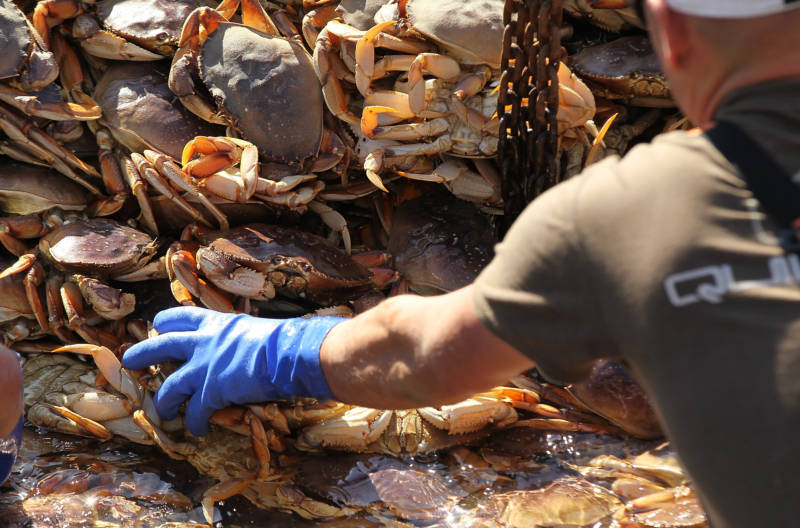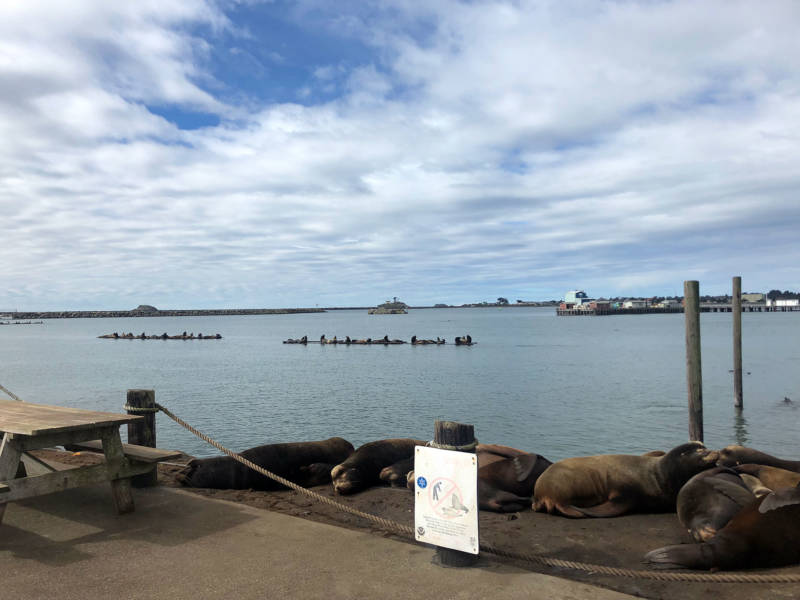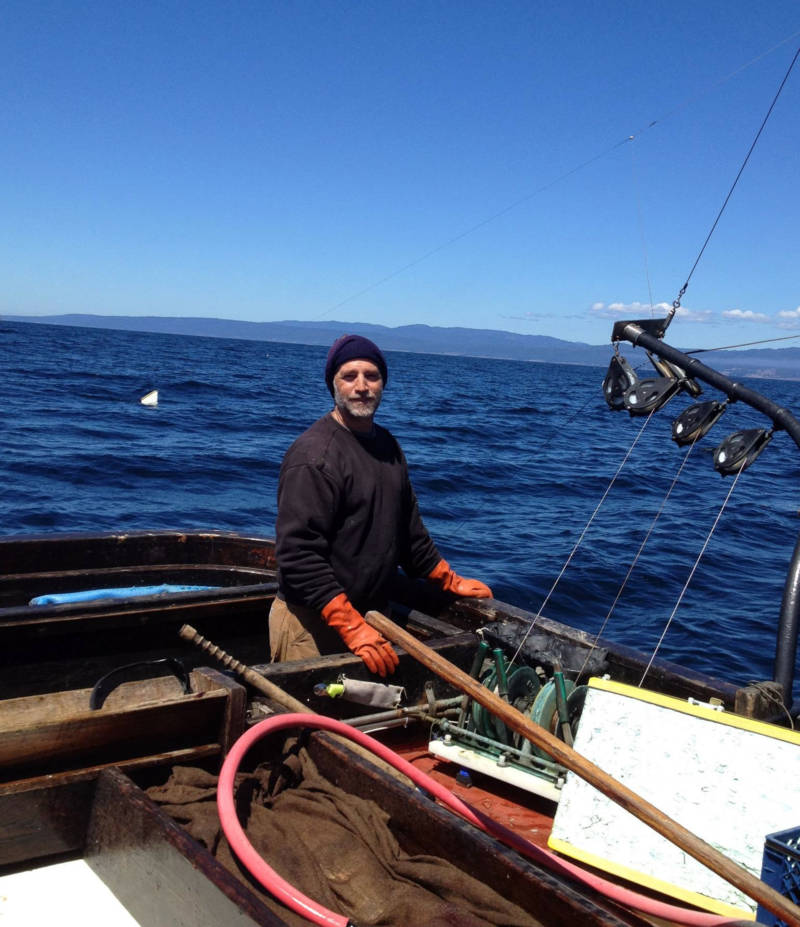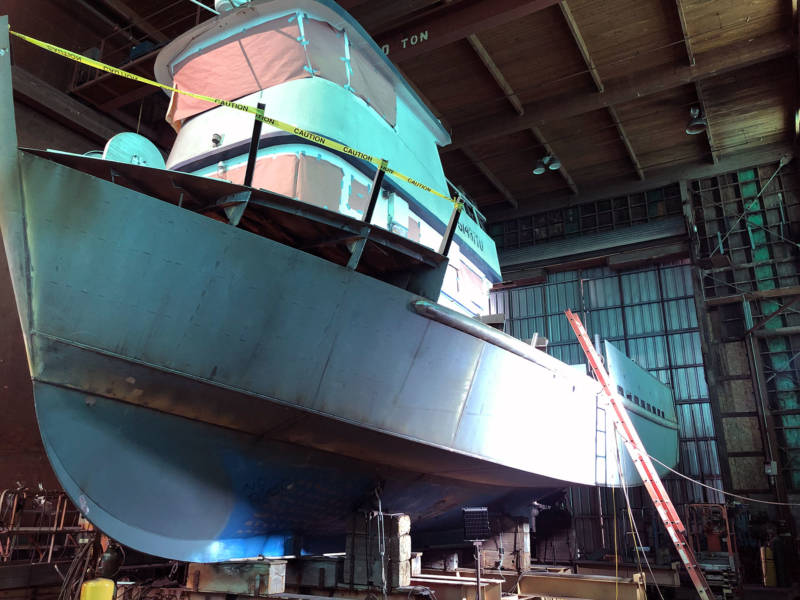Climate scientists estimate that the oceans have absorbed some 90 percent of the Earth’s warming in recent decades, which is why we’re seeing signs of climate change there first.
West Coast Crabbers Grapple With Climate Change

And that warming is impacting the livelihoods of California crabbers squeezed at both ends of the annual season by delays. A dangerous neurotoxin called domoic acid, emitted by algae blooms in warming waters, has been showing up in large concentrations in crabs and shellfish, and has caused delays in three of the last four crabbing seasons.
Ocean conditions also led to a spike in whale entanglements, resulting in a legal settlement that closed the season early this year and will see it shut four months early in coming years as well.
Shortened seasons have made it hard for crabbers to hold on to crews, which are essential to a thriving fishery. Boats often sit idle for months.
What’s Happening Off the Pacific Coast?
In late 2013, a large pool of warm water appeared off the Pacific Coast, which scientists took to calling “the blob.” Warm currents are normal in the region, but this was a large and spreading mass of water that measured up to 7 degrees warmer than average ocean temperatures at different points. By early 2015 it had spread from Alaska to Mexico. Scientists were perplexed, but eventually figured out what was going on … sort of.
It was a combination of factors: warming oceans, melting sea ice and a lack of wind, caused by what they called a “ridiculously resilient [atmospheric] ridge.” This is where it gets even more complicated: Scientists are still unsure whether the ridge caused the blob or vice versa, or whether they were just two anomalies occurring at the same time.

The net result was the same: The blob kept spreading, and the ocean’s upwelling — a process that churns up cold water and nutrients from the depths to the surface — had been interrupted. Without upwelling there wasn’t much phytoplankton, and without phytoplankton there was less krill than usual. And less of several other small fish, too. That meant marine mammals were going hungry.
At the same time, the blob sparked an enormous bloom of a particular type of algae that emits a potent neurotoxin, domoic acid. Crabs and various other shellfish are tested for their domoic acid content before the start of each fishing season, and if they test above 30 parts per million, the opening is delayed. That’s precisely what happened in 2015. The Nov. 15 opener came and went, then December, January and February, and finally the crab season opened March 26, 2016.
Fishing Season Delays Hit Crabbers Especially Hard
“We had just bought our first house, so taken on the biggest debt of our lives, and then the domoic acid shutdown happened,” says Ben Platt, who lives in the Sonoma County town of Windsor but fishes out of Crescent City, up by the California-Oregon border.
Platt grew up fishing with his dad at Point Arena in Mendocino County. “My brother and I started fishing in the summers, salmon trolling with our dad, when we were about 9 years old,” he says. “They used to let you get out of school early to fish. My brother started getting out a month early to work on boats when he was around 12.”
Platt preferred school. He went off to college, then moved to Los Angeles to pursue a music career, but life brought him back to boats.
“I got into drinking and then I went from drinking to drugging and that became a big problem for me,” Platt says. “When I hit bottom I was homeless in Los Angeles. I lived on the streets of L.A. I was in and out of jail and in a lot of trouble. And in my last day there I almost died. I got in a fight and got stabbed and I almost bled out. So that was my wake-up call. I ended up following my dad’s suggestion and went back with him to Fort Bragg.”

He started fishing with his dad again on day passes from rehab, and then after about a year his dad died suddenly.
“So I moved into town at that point with a year clean and sober to help my stepmom out,” Platt says. “And so I was like, well, there’s this leaky old skiff with an outboard motor that doesn’t run very well, and a trailer and a little pickup truck. And so I tried it and did well, and then I actually sank that first boat and was fishing out of a kayak for a while with a friend of mine.”
Platt says it was like sport fishing, but he was making money out of it. He eventually bought a Boston Whaler with a bigger engine and rented a little alley house in Fort Bragg.
“What’s happening lately, three out of the last four years, with our crews is we’re asking these guys to sit around and either make no money or very little money doing part-time jobs, but they have to be on call for when the season does start,” Platt says. “So it’s really hard for them to work, and our boats are sitting idle for three, four, five months at a time now.”
Most crabbers have permits for at least one other fishery, usually two or three, and Platt’s no different. But he says the delayed crab seasons are impacting other seasons, too.
“We crabbed that [2014-2015] year until the very end of the season, which in District 10 is June 30. And then it takes a couple of weeks to get your gear. We had to check our gear back home, break it all down, stack it,” Platt says. “So by the time we got salmon trolling it was already middle of August, so essentially salmon season was just about over by the time we started.”
Platt says most crabbers want to be wrapping up their seasons by late March at the latest, but that’s been tough in recent years.
“You have to be done with your crab season before we even started on these domoic acid years,” he says. “So last year we didn’t start until Feb. 7, or something like that. This year we started Jan. 22 up here. You can’t get a full crab season and a full salmon season, or if you’re a shrimper, you can’t get a full crab season and a full shrimp season. And so, yeah, the domoic acid thing, it throws everything off.”
Platt says the downtime has been hard on his crew, too.
“You know we can’t keep good crews, which are essential to doing well with these fisheries, if we can’t keep them employed essentially year-round,” he says.
The domoic acid closures prompted the crabbers’ trade association — the Pacific Coast Federation of Fishermen’s Associations (PCFFA) — to file a suit last year against the world’s largest oil companies. Crabbers allege that oil companies knew their product contributed to climate change, yet failed to adequately warn the public.
In an email, Chevron spokesman Sean Comey wrote, “It’s always regrettable to be in a legal dispute with a customer, especially considering how much diesel the fishing fleets purchase.”

It was the same issue many crabbers, including Platt, had with the case when they first heard about it. “You know, my initial reaction was just like a lot of other fishermen. It’s like, well I have a diesel engine in my boat. So why would I want to sue a fossil fuel company?”
But after digging into the history of oil industry-funded strategies around climate change, Platt changed his mind, along with many of his colleagues.
“You know, I think what it boils down to for me is that I’ve done everything I could do as a fossil fuel-burning boat operator commercial fisherman to minimize my carbon footprint,” Platt says. “We’re doing whatever we can, but there’s only so much that we can do. We’re not the fossil fuel companies, we’re not the big energy companies. We’re not scientists. We can’t figure out how to make a hydrogen cell or something that’ll power our boats. You know, we’re just using what’s available.”
Despite all the turmoil, Platt isn’t giving up on the ocean anytime soon. He’s in the midst of building a bigger boat, and this summer he’ll head up to Oregon, Washington and Canada, where warmer waters are making for great tuna fishing.
You can hear more of this story in Season 2 of the podcast Drilled, which launched on April 22, 2019.
